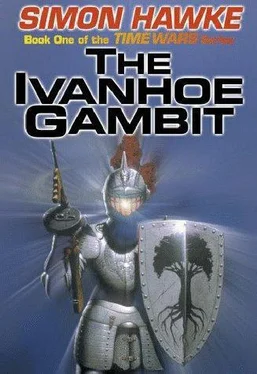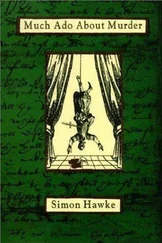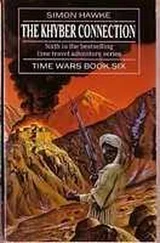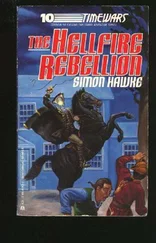Simon Hawke - Ivanhoe Gambit
Здесь есть возможность читать онлайн «Simon Hawke - Ivanhoe Gambit» весь текст электронной книги совершенно бесплатно (целиком полную версию без сокращений). В некоторых случаях можно слушать аудио, скачать через торрент в формате fb2 и присутствует краткое содержание. Жанр: Фантастика и фэнтези, на английском языке. Описание произведения, (предисловие) а так же отзывы посетителей доступны на портале библиотеки ЛибКат.
- Название:Ivanhoe Gambit
- Автор:
- Жанр:
- Год:неизвестен
- ISBN:нет данных
- Рейтинг книги:5 / 5. Голосов: 1
-
Избранное:Добавить в избранное
- Отзывы:
-
Ваша оценка:
- 100
- 1
- 2
- 3
- 4
- 5
Ivanhoe Gambit: краткое содержание, описание и аннотация
Предлагаем к чтению аннотацию, описание, краткое содержание или предисловие (зависит от того, что написал сам автор книги «Ivanhoe Gambit»). Если вы не нашли необходимую информацию о книге — напишите в комментариях, мы постараемся отыскать её.
Ivanhoe Gambit — читать онлайн бесплатно полную книгу (весь текст) целиком
Ниже представлен текст книги, разбитый по страницам. Система сохранения места последней прочитанной страницы, позволяет с удобством читать онлайн бесплатно книгу «Ivanhoe Gambit», без необходимости каждый раз заново искать на чём Вы остановились. Поставьте закладку, и сможете в любой момент перейти на страницу, на которой закончили чтение.
Интервал:
Закладка:
Conventional wisdom had held that it was impossible to create such a paradox, at least until Mensinger had proved that it was. It had been believed that since you were born and since your past was absolute, something in the past would have prevented your taking your grandfather's life. However, given the potential for parallel timelines, it was very possible, indeed.
Mensinger hypothesized that if you went back into the past to kill your grandfather and succeeded in so doing, the action would create a ripple in the timestream, a split in the timeline. Since there had to exist an absolute past in which your grandfather did not die, a past in which he met your grandmother, married her and procreated your father, which action led to your own birth; that past was absolute for you taking the action and could not be changed, since the past had to occur before you took action to change it. Once you took that action, a parallel timeline was created, one in which your grandfather had died. These two timelines, the one which represented your absolute past and the one which you had created by your action, ran parallel to one another in a linear fashion.
Yet, these two timelines had to rejoin at some point in the future. The danger therein lay in the fact that in the timeline in which your grandfather had died, there existed the distinct possibility that your grandmother would marry someone else. She could very possibly give birth to someone other than your father, which action progressively led to other events. Theoretically, wrote Mensinger, the timelines would become rejoined when the traveler to the past returned to the future (or the present) from which he came. However, he wrote, given some common degree of longevity on the part of the two grandmothers in the parallel timelines, when these timelines rejoined, there existed the possibility that grandmother would be duplicated, sharing with her twin an absolute past prior to the split. This raised all sorts of fascinating possibilities.
Mensinger's "Fate Factor" came into play at the point at which the split in the timeline was created. The moment that the action taken to create the split occurred, the future was in flux, creating an infinite number of potential scenarios. Any disruption in the timestream, like eddies caused by throwing a rock into the water, had to eventually respond to the inertia of the flow. The inertia of time, on the grand scale, worked to minimize the effects of such disruptions. This was the "Fate Factor." However, according to Mensinger, the grand scale in terms of time was not necessarily what would be defined as a grand scale in human terms. Disasters on the human scale were possible. Significant changes at the point of the rejoining could occur.
Irving had thought that he had spotted a flaw in Mensinger's theory. He had become obsessed with it. Mensinger had postulated that parallel timelines would rejoin when the traveler to the past returned to the time from which he came. In such an instance, the rejoining of the timelines would most likely have abrupt and jarring effects. However, what would happen if the traveler to the past did not return at all to the time from which he came? Suppose this traveler lived out the remainder of his life in the parallel timeline which he created. Would it not be possible, in that event, for the timelines to eventually rejoin at some point far beyond the point from which the time traveler departed? On the grand scale of time, there had to be a point at which past history was insignificant, unknown completely to the people living in that time, much as the history of man in his most primitive stages was totally unknown to modern scholars. Under such circumstances, could history not be changed to the benefit of all mankind? Irving had discussed his theory with other referees, which he now knew had been a great mistake. He had expected that they would agree with him wholeheartedly, but such had not been the case. They had argued that taking such an action could have disastrous consequences, that he had misinterpreted Mensinger's work. In order for his theory to prove valid, they had argued, it would be necessary for him to exert a continuous influence upon the timeline. Even though, as he hypothesized, he would travel into the past never to return, the parallel timelines would have to come together the moment his splitting influence ceased to become a factor. The moment that he died, they said, the rejoining would occur. There was no chance of the grand scale split which he proposed.
He could not accept that. He could not accept that his influence, the role that he had played, would end with his demise. They were wrong. He would prove them wrong.
The single mistake that he had made was in sharing his theory with the other referees. They were fools, bogged down in their bureaucratic roles, interpreting the moves of pawns upon time's chessboard. They shook as if with ague at the very possibility of an upset in the flow. They were totally incapable of making the intuitive leap that was so necessary to the great discovery. As had always happened in the past, they-with their feet firmly planted in the mud-decried the attempts that he, the visionary, made to transcend the boundaries of ignorance. Genius is never appreciated in its own time, thought Irving. He chuckled. He had put a new slant on that cliche.
Once he became the king, once the interference of the adjustment teams was ended, there would be no limit to what he could accomplish. He never should have told them, never. He had given them ammunition against himself, warned them of what might happen. They had been prepared to move against him and they had moved against him before he could affect the changes he had planned. If he was not careful, very careful, if he made even one mistake, they could still win.
But he would not make any mistakes.
Hooker was convinced that something had gone wrong.
The plan had been for Lucas to secure a place in Cedric's party and, at the very first opportunity, to reveal himself as Ivanhoe to Cedric. Whichever way things went from there, whether Gedric would forgive his "son" following his change of heart or whether he would remain intractable, Lucas was not to continue on to Rotherwood, but to return to Isaac's house and to reclaim his squire and armor. He was to repay Isaac the loan plus the interest-which was exceedingly high, doubtless owing less to Isaac's greed than to the fact that John was bleeding him dry-and from there they were to proceed to Sherwood for a rendezvous with Finn and Bobby. Ideally, if those two had managed to establish their position with the merry men, they would then use them to make inquiries concerning the whereabouts of the black knight.
But Lucas was overdue.
He should have been back by morning or, at the latest, by the afternoon. Now it was growing dark outside and Lucas still had not returned. Something must have happened.
He had to get his hands on the nysteel armor. The only problem was, Isaac was jealously protecting it. There was an additional problem in that he didn't have a horse. Finding a horse presented no great difficulty, but he still had to get away from Isaac. Technically, he was Isaac's property for the duration, until Lucas came to redeem him. As such, he was Isaac's guest, kept in a small room that was sparse and spartan, although clean. Bondsmen, as the collar on his neck identified him, were notorious for running away at first opportunity. His station was somewhat better than that of the average bondsman in that he served a knight, but he was still that knight's property. Isaac treated him well, seeing to it that he was fed and comfortable, which cost had been included in the interest, but Isaac felt that it was his responsibility to see to it that Hooker was still there when the white knight came to call for his belongings. He had two choices. He could escape and search for Lucas on his own, or he could attempt to persuade Isaac to assist him.
Читать дальшеИнтервал:
Закладка:
Похожие книги на «Ivanhoe Gambit»
Представляем Вашему вниманию похожие книги на «Ivanhoe Gambit» списком для выбора. Мы отобрали схожую по названию и смыслу литературу в надежде предоставить читателям больше вариантов отыскать новые, интересные, ещё непрочитанные произведения.
Обсуждение, отзывы о книге «Ivanhoe Gambit» и просто собственные мнения читателей. Оставьте ваши комментарии, напишите, что Вы думаете о произведении, его смысле или главных героях. Укажите что конкретно понравилось, а что нет, и почему Вы так считаете.












